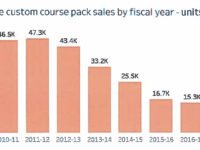The challenges faced by the Canadian media sector represent an incredibly challenging policy issue for the government. The struggles to adapt to heightened competition in the digital environment – the local paper now competes with a myriad of alternative choices – has led to layoffs, closures, and intense lobbying for a bailout. For the past few years, the government has largely resisted the lobbying efforts, recognizing the risks to the independence and trust in media that can come from government funding for the media itself. While concerns about government influence over the media and journalists are nothing new (I appeared before two Senate committees yesterday which both featured prominent former journalists), there is a difference between the prospect of future appointments and the perception of cash for favourable coverage.
Latest Posts
Misleading on Fair Dealing, Part 4: The Shift from Coursepacks to Digital Course Management Systems
The changing state of course materials in education involves more than just increased reliance on alternative materials such as journal and newspaper articles. Yesterday’s post highlighted the significant decline in book copying as part of coursepack materials, but the data also consistently demonstrates that coursepacks are being abandoned in favour of digital course management systems (CMS)(previous posts in the misleading on fair dealing series on the impact of the 2012 reforms, the wildly exaggerated suggestion of 600 million uncompensated copies each year, and the decline of books in coursepacks).
Misleading on Fair Dealing, Part 3: Data Shows Books Are Rapidly Declining as Part of Coursepack Materials
The misleading claims on fair dealing extend beyond the impact of the 2012 reforms and the wildly exaggerated claim of 600 million uncompensated copies each year. Given that educational institutions have increased their licensing spending since 2012, Access Copyright has sought to downplay the investment at the copyright review by arguing that site licensing is primarily focused on access to journals while copying for coursepacks predominantly involves excerpts from books. The implication of the Access Copyright argument is that book copying remains as relevant as ever and that site licensing does not cover that form of copying. These arguments are misleading, however, since the data suggests that book copying is rapidly declining as part of coursepacks, coursepacks themselves represent a small percentage of course materials, and books are in any event an increasingly large part of university site licensing. Posts over the next three days will address each of these issues.
Misleading on Fair Dealing, Part 2: Why Access Copyright’s Claim of 600 Million Uncompensated Copies Doesn’t Add Up
My series on how the copyright review has been misled on fair dealing continues with one of Access Copyright’s most attention-getting claims: that each year “600 million pages of copyright-protected content is being copied for free each year by the education sector” (Part 1 on inconsistent claims on effect of 2012 reforms). The 600 million page figure has attracted widespread coverage, regularly cited by Access Copyright supporters (Association of Canadian Publishers, Writers’ Union of Canada) and noted by Members of Parliament. However, a closer examination reveals that the number is the result of outdated guesswork using decades-old data and deeply suspect assumptions.
Misleading on Fair Dealing, Part 1: Access Copyright’s Inconsistent Claims on the Legal Effect of the 2012 Fair Dealing Reforms
Fair dealing has unsurprisingly emerged as one of the dominant topics of the ongoing Canadian copyright review. While educational institutions maintain that spending on content has increased since the 2012 reforms that added education to the list of fair dealing purposes, Access Copyright and the publishing community argue that licensing revenues have declined. Starting today, I’ll be posting a series on fair dealing that unpack many of the issues and demonstrate why House of Commons committees studying the issue may have been misled by exaggerated and inaccurate claims.
The series starts with the foundational argument from Access Copyright and its supporters, namely that current educational practices are the result of the 2012 copyright reforms that led to a significant expansion of fair dealing. The implication is that the government broke their compensation system in 2012 and should “fix it” by curtailing educational use of fair dealing. Future posts will explain why licensing has actually increased since 2012, but this post is limited to the oft-heard claim that the 2012 reforms are to “blame” for current educational practices.











